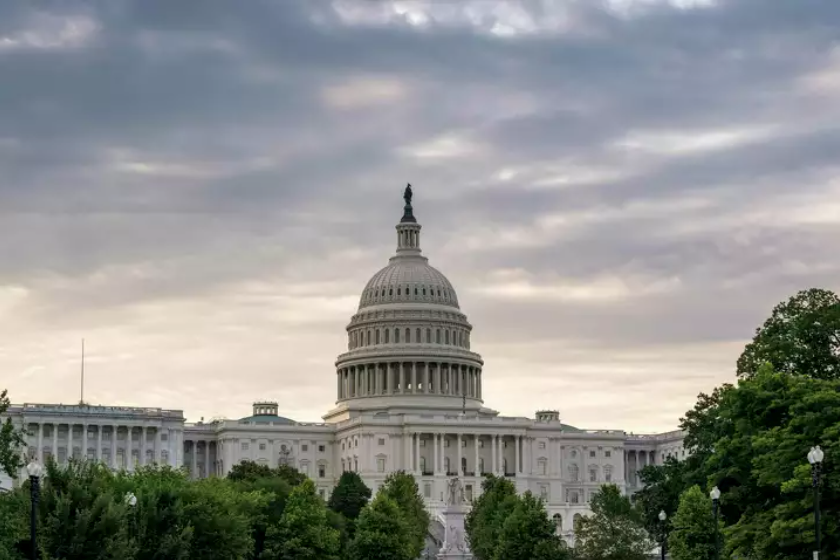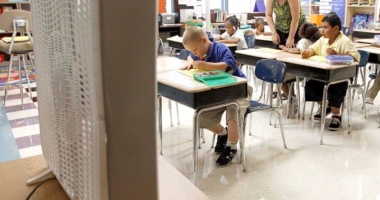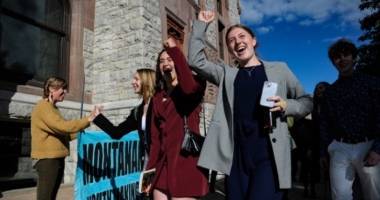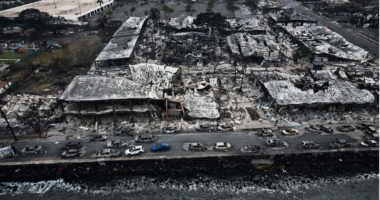Climate, Health and Equity Brief
The United States of climate disputes
May 1, 2023
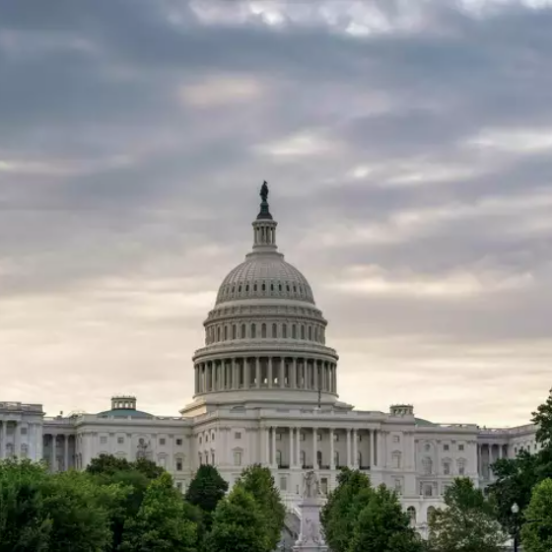
The Climate, Health & Equity Brief is GMMB’s take on the last two weeks’ news on the current impacts of climate change. If you haven’t subscribed yet, you can do so by clicking here.
Hot Topic: Turbulence. Senator Joe Manchin (D-WV) and House Republicans spent this week doing everything in their power to hobble the implementation of the Inflation Reduction Act (IRA).
In the House, Speaker Kevin McCarthy (R-CA) negotiated the narrow passage of a debt ceiling bill that eliminates most clean energy tax credits and slashes billions of dollars earmarked for pollution reduction, energy efficiency and environmental justice previously passed in the IRA. And in the Senate, Joe Manchin (D-WV)—who single-handedly held up the sweeping climate policy last year—announced this week that he would support the repeal of the IRA he personally negotiated unless President Biden makes good on the fossil fuel investments in the bill, which he has accused the president of slow-rolling.
Despite the headwinds, the White House continues to push forward. This week, President Biden announced an additional $1 billion contribution to the Green Climate Fund to finance clean energy and climate change resilience in developing countries. He also pledged $500 million to assist Brazil with their efforts to end deforestation in the Amazon, though the contribution requires congressional approval—an uphill battle given how hostile the House Republican majority is to climate investment and action.
On the domestic front, President Biden announced the creation of the White House Office of Environmental Justice to address the fact that low-income and non-white communities suffer most from environmental hazards. And the EPA is expected to announce emission limits on U.S. power plants that will put the country on track to reach net zero by 2050 if implemented, though they are almost guaranteed to face a legal battle from a group of Republican attorneys general that has already sued the Biden administration to stop other climate policies.
— Matt and Traci
Human Health
The latest report from the American Lung Association finds that while air quality has improved for 19 million Americans, wildfires, heat and drought are intensifying particulate matter pollution, people of color are 64% more likely to live in counties with failing air quality grades, and air pollution is a danger to one in three Americans. (Vox)
At least 11 people died at an outdoor event near Mumbai following heat and humidity levels that somehow failed to trigger a heat advisory, highlighting how ill-prepared many local and state governments are in a country at exceptionally high risk of the dangers of extreme heat. (The New York Times)
A growing number of adults are experiencing seasonal allergies for the first time because temperature increases and the combustion of fossil fuels have caused pollen season to be three weeks longer and have 20% more pollen in the air than 30 years ago. (NBC News)
A new EPA report finds that increased heat will have particularly troubling impacts on children, with asthma, severe allergies, insect-borne diseases, and learning difficulties all set to spike with just under 1°C of additional warming. (CBS News)
The Horn of Africa is currently facing its worst drought in 40 years, resulting in acute food insecurity for 20 million people and thousands of related deaths—and a new study finds that severe drought is now 100 times more likely in the region than in the pre-industrial era due to human-caused climate change. (The New York Times)
Planetary Health
A new study published in the Proceedings of the National Academy of Sciences revealed that methane pollution levels from the U.S. oil and gas industry were 70% higher than EPA estimates between 2010-2019, highlighting insufficiencies with current federal systems for detecting leaks. (CNN)
A new study published in Nature Communications warns that the climate crisis could reduce life in the ocean’s ‘twilight zone’ by 20-40% by the end of the century, and “severely deplete” it within 150 years unless we rapidly reduce greenhouse gas emissions. (CNN)
Equity
President Biden announced the U.S. would contribute an additional $1 billion to the Green Climate Fund, which finances clean energy and climate resiliency projects in developing countries. (Reuters)
President Biden signed an executive order establishing a White House Office of Environmental Justice and requiring federal agencies to develop plans to address the disproportionate impact of climate change on minority and tribal communities. (The New York Times)
The EPA announced that it will create 17 technical assistance centers around the U.S. that will help community organizations gain easier access to environmental justice funding made available under the Bipartisan Infrastructure Law and the Inflation Reduction Act. (Inside Climate News)
Politics & Economy
House Republicans passed a bill to raise the debt ceiling, which included cutting billions of dollars in funding for pollution reduction, energy efficiency and environmental justice previously passed in the Inflation Reduction Act. (E&E News)
President Biden pledged $500 million to help Brazil’s efforts to end deforestation in the Amazon rainforest, though the funding still requires congressional approval—an uphill battle in the Republican-controlled House. (The Washington Post)
Senator Joe Manchin (D-WV) said he will support the repeal of the Inflation Reduction Act, a law he was a key negotiator for, if the Biden administration doesn’t rein in clean energy spending and increase fossil fuel investment for energy security. (NBC News)
The EPA is expected to announce emission limits on U.S. power plants that will put the country on track to reach net zero by 2050 if implemented, though they are almost guaranteed to face a legal battle from a group of Republican attorneys general that has already sued the Biden administration to stop other climate policies. (The New York Times)
The Biden administration announced the findings of the federal government’s first-ever catalog of mature and old growth forests, finding that more than 110 million acres of federally owned forests may be old enough to deserve special protections. (E&E News)
In a victory for climate litigation, the U.S. Supreme Court declined to hear appeals from Chevron, Exxon, and Suncor Energy requesting to move five lawsuits against them from state to federal courts, opening the door for others to pursue climate claims at the state level, which is seen as more advantageous for seeking damages. (Inside Climate News)
After two years of negotiation, the EU Parliament approved legislation that would tax imports based on the greenhouse gasses emitted to produce them, an effort that incentivizes countries to put a price on emissions and enshrines climate regulation in global trade rules for the very first time. (The Wall Street Journal)
States across the country are grappling with how to regulate the carbon sequestration industry that is now taking in the wake of major investments from the Inflation Reduction Act. (E&E News)
Chilean President Gabriel Boric announced plans to nationalize the country’s lithium industry as it becomes increasingly critical to EV battery production, promising to redistribute the resulting income to protect biodiversity and benefit indigenous communities and those most impacted by mining and climate change. (Reuters)
Life as We Know It
Several studies in recent years have shown that climate change is increasing global wind shear, which is contributing to an increase in airplane turbulence—a phenomenon gaining recent attention given the proliferation of viral videos showing people screaming and cabins strewn with debris. (NBC News)
Action
California approved first-in-the-nation rules limiting train pollution that will ban locomotive engines more than 23 years old by 2030, increase the use of zero-emissions technology and ban locomotives from idling longer than 30 minutes if they are equipped with an automatic shutoff. (NPR)
Airbnb is piloting a new program that will help vacation rental owners slash emissions by providing them with $2,500 in cash rebates towards energy efficient upgrades and heat pump installations. (Canary Media)
Kicker
Think the only impact of melting ice is sea-level rise? Check out this visual, interactive, and informative brief and quiz from NPR, which will make you think again.
We’re at a moment of great peril but also great possibilities.”
– President Joe Biden
The GMMB Climate, Health & Equity Brief would not be possible without the contributions of the larger GMMB team— Aaron Benavides, Thomas Baer, Stefana Hendronetto, Sharde Olabanji, and Quincy Tichenor. Feedback on the Brief is welcome and encouraged and should be sent to CHandEBrief@gmmb.com.

)

